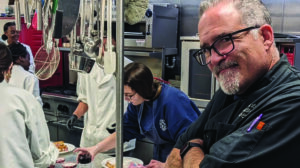Helicopter parents of high school children are taking their hovering behavior to new heights, especially when it involves college admission applications. According to the Urban Dictionary, a helicopter parent is “the bane of the dean’s existence. The parent who hovers and flaps his wings while the kid lives in his shadow. Particularly prevalent at high-priced colleges, where parents feel obliged (or entitled) to intervene on issues down to the candlepower of the lightbulbs.îHelping with homework and meeting with teachers is appropriate, but engineer-type moms and dads who do their kidís science fair projects and parents who hire professional writers to draft college admission essays are crossing the line. A September job posting on a freelance journalism and content writing site created controversy on LinkedIn among writers and editors. A parent created an account named ìGet Emy In,î asking professional journalists to bid on writing her daughter’s college admissions essay, along with asking newspaper editors to edit the teachers’ letters of recommendation. ìWe live in a farming rural area where kids don’t usually go to college and the teachers are not used to writing recommendation letters,î the parent wrote in the pitch.ìThis is not a new phenomenon,î said Jeff Fuller, president of the National Association for College Admission Counseling and director of student recruitment for the University of Houston. ìOver the last four or five years, more parents have sought out additional professional help for applications.îFormer Falcon School District 49 internship coordinator and community relations specialist Kathleen Saltmarsh-Voss (currently the community relations specialist for Intellitech Medical Institute) said this kind of thinking in parents is not unusual. ìThere were a lot of parents who desperately wanted their students to be in the internship program, and regardless of how much I tried to get the students to do the forms and application work, it always ended up being communication with the parents,î Saltmarsh-Voss said. ìWhen the kids didn’t have the buy-in themselves, it was always disastrous.îGaming college admissions is not a new phenomenon. It is especially common among international students attending American colleges and universities. A May 2010 study by Zinch China showed that 90 percent of recommendation letters for Chinese students seeking to attend U.S. schools were written by someone other than the teacher. Seventy percent of the admission essays were written by someone else.Domestic students are also plagiarizing and hiring out their college admissions essay work at a high rate. Turnitin, a company specializing in software that detects plagiarized work, published a January 2010 report showing that 36 percent of personal statements submitted to college admissions offices contained significant matching text to work on websites like personalstatement.info and essaybank.com. Major universities, including Penn State, Stanford and the University of California at Los Angeles, use the company’s ìTurnitin for Admissionsî system to spot discrepancies in applications.ìAdmissions officials are not brand new at their job,î Fuller said. ìOfficials can identify quickly that the essay has been coached, especially when it’s not written in a high school senior’s voice.î A clearly coached or ghostwritten essay and personal statement will not necessarily result in an automatic denial, but it is a significant red flag for admissions officers, Fuller said. ìSometimes, we will reach out to the applicant to supply an assigned topical or timely piece as another test of the student’s writing style,î he said.The University of Colorado at Colorado Springs uses a more formulaic approach to admissions that reduces the chance for gaming, said Tom Hutton, executive director of media relations. ìAs a state school, our admissions process is fairly prescribed, so our standards don’t consider essays, statements or other issues that are ‘squishy,’ so to speak,î Hutton said. ìWe look at standardized tests, GPA and high school rank, which is harder to game. It’s a formula, and we make that pretty clear to students. We look at how you do in high school. So do well in high school.îLong-term grades are harder to game, and the penalties for forging transcripts are significant. If a false transcript or forged letter is used to receive grants or scholarships, the recipient can be charged with fraud. However, even ordinary parent hovering and unhealthy forms of over-involvement throughout elementary and high school years can have a detrimental effect on college and future success. Saltmarsh-Voss described times when she was helping with school district science fairs, where some projects were clearly too advanced for the age level. ìI saw a lot of parents who had a lot more fun with their kids’ projects than their kids did,î she said.A long history of mom and dad doing homework ó rather than helping with homework ó means that kids will be less likely to succeed in college or life. ìThe kids have a sense of, first, no accountability because the parents will take care of it; and, second, it’s hard to feel a sense of growing maturity when you aren’t making those steps yourself,î Saltmarsh-Voss said. ìThat sort of thing does nothing but damage on every level. What does the daughter think when mom doesn’t even trust her own teachers to write letters of recommendation?îìAn ethic we hold firm to is that everything submitted is led by the student,î Fuller said. ìIt is something that is an increasing issue not in number of applicants but impact, as more families are concerned about the process and trying to be an advocate for their student. It’s OK for family to review and encourage the student, but it needs to be their work.î






